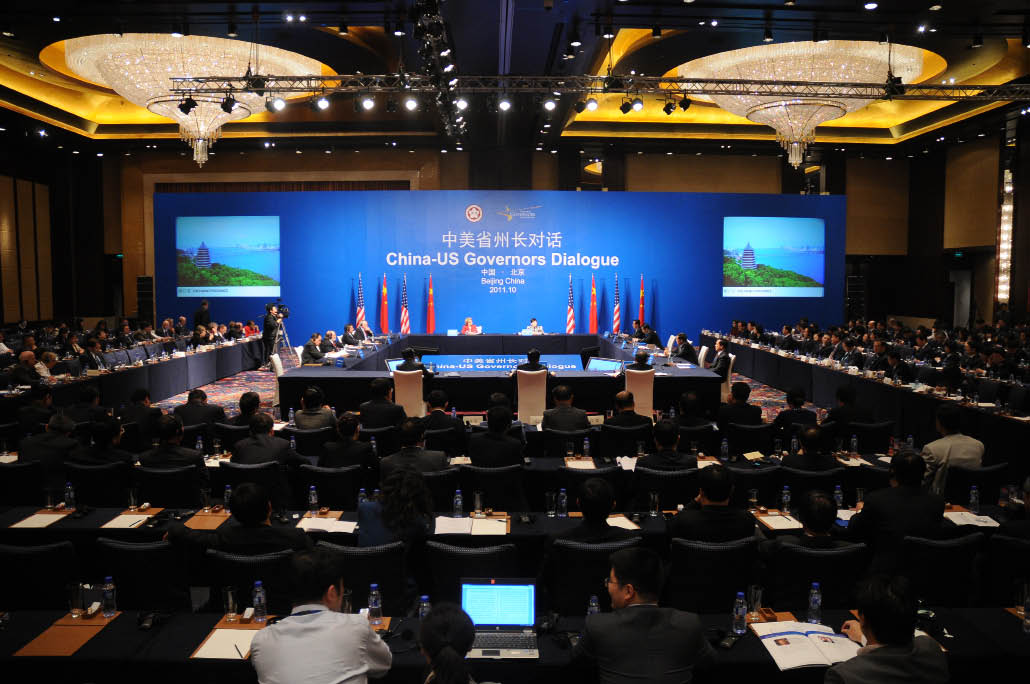| Bridging the Pacific
Intergovernmental Forum Brings Chinese and American Regions Closer
By LI SANGHUA
|

|
|
The forum is part of efforts to continue broadening the scope of the China-U.S. relationship. |
AROUND 8,000 people travel between China and the U.S. every day. Situated on opposite sides of the Pacific Ocean, these two nations have close relations in trade, education, and between governments and non-governmental organizations. Nevertheless, more effective channels could be set up to facilitate ever-increasing exchanges and communication.
The U.S.-China Memorandum of Understanding signed during President Hu Jintao's visit to the U.S. in January 2011 announced that the China-U.S. Governors Forum would be jointly organized by the Chinese People's Association for Friendship with Foreign Countries (CPAFFC) and the National Governors Association (NGA) of the United States to enhance cooperation in regional level trade, investment, energy, environment and culture.
The forum laid a solid foundation for long-term cooperation based on mutual benefit, thus providing new momentum for the comprehensive development of Sino-U.S. relations.
Building Subnational Platforms
In February 2011, Zhou Qiang, secretary of the Hunan Provincial Committee of the Chinese Communist Party, and Li Xiaolin, vice president of CPAFFC, were invited to the U.S. National Governors Association (NGA) Winter Meeting. A formal agreement was singed by Li Xiaolin and Christine Gregoire, Washington's governor announcing the launch of the China-U.S. Governors Forum.
During their stay in Washington DC, Zhou Qiang and Li Xiaolin also met with U.S. Secretary of State Hillary Clinton, Under Secretary of State Robert Hormats and Senior Director for Asian Affairs on the National Security Council Jeffrey Bader. Zhou also had high-level talks with governors from six states including Washington, Nebraska, Delaware, Utah, North Carolina, Montana and Georgia.
According to Reta Jo Lewis, special representative for Global Intergovernmental Affairs at the U.S. Department of State, it is the first time the U.S. government has organized a forum for every state to talk with another country's provincial governments, and this is part of efforts to continue broadening the scope of the China-U.S. relationship.
The Governors Forum is considered one of the achievements of the third round of the China-U.S. Strategic and Economic Dialogue (S&ED) held in Washington DC in May 2011.
In July 2011, 110 Chinese representatives, led by Zhao Hongzhu, secretary of the Zhejiang Provincial Committee of the Communist Party of China, attended the first China-U.S. Governors Forum in Salt Lake City, Utah. Key participants included 24 U.S governors as well as Li Xiaolin, Anhui Provincial Governor Wang Sanyun, Yunnan Provincial Governor Qin Guangrong and Qinghai Provincial Governor Luo Huining. The forum dealt mainly with trade and investment, new energy, environmental protection, education and youth cooperation.
Chinese President Hu Jintao and his U.S. counterpart Barack Obama as well as China's Foreign Minister Yang Jiechi and U.S. Secretary of State Hillary Clinton all sent congratulatory messages to the forum.
In his message, Hu said the successful launch of the forum and its future development will build a new bridge between Chinese provinces and U.S. states, create a new platform for deepening the understanding between the two peoples and make positive contributions to constructing a cooperative partnership based on mutual respect and mutual benefit.
US President Barack Obama said in his congratulatory message, "A positive, constructive, and cooperative relationship between the United States and China is essential to the success of both countries in the 21st century. Closer engagement at the sub-national level will build strategic trust and create new opportunities for our companies and workers."
As well as meeting as a whole, Chinese provincial chiefs arranged for 28 one-on-one meetings with their U.S. counterparts and hammered out 28 individual agreements, letters of intent for cooperation and memorandums of understanding over topics such as sister cities, energy, the environment and medicine. In total, these meetings generated a contracted capital of US $3.2 billion.
A few months later in October eight Chinese provincial governors and six U.S. state and territorial governors gathered in Beijing to attend the second round of the first Governors Forum. Zhao Hongzhu, Zhou Qiang, Wang Sanyun, Beijing Mayor Guo Jinlong, Liaoning Provincial Governor Chen Zhenggao, Shandong Provincial Governor Jiang Daming, Jiangxi Acting Provincial Governor Lu Xinshe, and Yunnan Acting Provincial Governor Li Jiheng held dialogues on promoting local economic development and people's livelihood with Christine Gregoire, Georgia Governor Nathan Deal, Guam Governor Eddie Baza Calvo, Hawaiian Governor Neil Abercrombie, North Carolina Governor Bev Perdue and Benignor R. Fitial, governor of the Northern Mariana Islands.
On meeting attendees, China's Vice Premier Wang Qishan stressed that Chinese provinces and U.S. states should implement the consensus reached between the two heads of state to strengthen cooperation on trade and the economy, investment, science and technology, tourism, culture and education with the aim of creating a sound atmosphere and providing excellent avenues for cooperation between organizations and businesses. This should effectively promote economic growth and employment in both countries.
On behalf of the government, China's Vice Foreign Minister Cui Tiankai and U.S. Under Secretary of State Robert Hormats gave their remarks at the governors' dialogue. Cui hoped that the dialogue would become a catalyst for China-US subnational cooperation as a propeller of China-US business ties and a bridge of friendship between the people of the two countries. Robert Hormats stated that the Governors Forum is expected to be an effective way to facilitate the two nation's communication and expand investment and cooperation so as to boost economic development.
In addition to plenary sessions, the Beijing forum provided U.S. governors with the opportunity to engage in direct talks with Chinese governors on topics of mutual interest and to explore opportunities to enhance practical cooperation. Although no new contracts or agreements were signed, the follow-up of the first forum reinforced the positive results and insured long-term cooperation.
| 